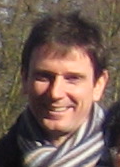Biography
I graduated with a BS in Experimental Psychology, and a BA in Philosophy from Austin Peay State University in the US. From there, I went on to do my PhD in Anatomy and Neurobiology at the University of Tennessee (UT), where I researched how astrocytes (glial cells) affect the development and repair of neural circuits in the central nervous system. After successfully completing my degree at UT, I was fortunate to work 2.5 years in the laboratory of Dr. Anders Bjorklund (the innovator of the technique of neural transplantation for Parkinson’s disease) at Lund University in Sweden, where I conducted studies on the possibility of astrocyte phenotypes existing in the brain. Following my studies there, I went to Harvard University where I became a postdoctoral Fellow, working with Dr. Jeffrey Macklis to study development of cortical projection neurons and axon guidance. After 3 years at Harvard University, I begin working with Professor Stephen B. Dunnett at Cardiff University, where I conducted work on the emergence and development of dopaminergic neurons in the developing brain. I then came to Keele University where I have (hopefully) combined this body of work by beginning studies on what proteins and cells are involved in the development of motor circuitry in the central nervous system.
Research and scholarship
My lab focuses on the use of proteomics, cell culture, and in vivo models to understand how cells develop and find appropriate targets in the central nervous system. Over the past 5 years, we have developed a unique device to transplant tissue and constructs into the brain for repair, and have begun to describe changes (at the molecular level) in the brain as it develops, ages, and degenerates. We have a great deal of interest in Parkinson’s disease, and how dopamine neurons are born, develop and degenerate. We are particularly interested in how dopamine neurons, and other neurons involved in the motor output of the brain (e.g., cortico-spinal neurons) find their appropriate target / connection during development. The hope of this research is to find ways to (re) wire the brain to repair diseases and disabilities that affect an individual’s ability to move.
Publications
School address:
School of Pharmacy and Bioengineering
Hornbeam Building
Keele University
Staffordshire
ST5 5BG
Research centre address:
School of Pharmacy and Bioengineering
Guy Hilton Research Centre
Thornburrow Drive
Stoke-on-Trent
ST4 7QB
Undergraduate enquiries:
Email: enquiries@keele.ac.uk
Tel: +44 (0)1782 734010
Postgraduate enquiries:
Please contact the CPD4ALL team:
Email: phab.postgraduate@keele.ac.uk
Keele Centre for Medicines Optimisation (KCMO)
Tel: +44 (0)1782 733831 / 734131
The Virtual Patient project enquiries:
Contact our Digital Development team:
Email: pharmacy.digital@keele.ac.uk


